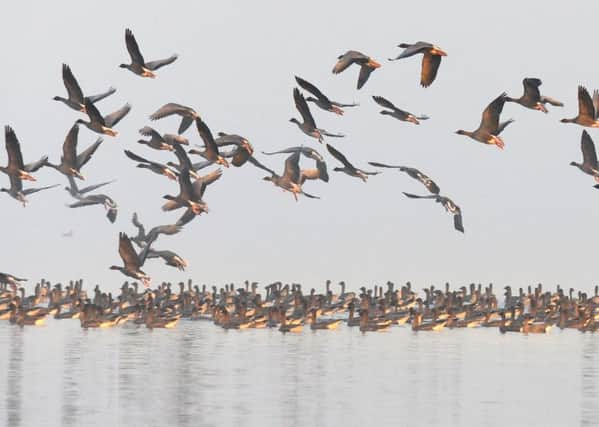Scots birds ‘still being poisoned by lead shot’


The use of lead in shotgun cartridges has been outlawed in wetland areas north of the Border for the past decade.
But conservationists say there is irrefutable evidence that swans and many other species are still suffering from high levels of lead poisoning.
Advertisement
Hide AdAdvertisement
Hide AdWaterfowl such as ducks, geese and swans deliberately swallow small pieces of grit to help grind their food and aid digestion. They can easily ingest discarded lead shot by mistake.
The resulting poisoning is often fatal as it damages the nervous system, liver and kidneys and can harm the gizzards, leaving birds unable to feed.
Affected birds typically suffer a lack of coordination and balance, which can raise the chances of death from other causes.
However, there has been “huge amounts of resistance” to the new law among game-baggers, according to the wildlife charity RSPB.
“People are just ignoring the laws and there is no proactive enforcement,” said species policy officer Keith Morton.
A recent study by the Wildfowl and Wetlands Trust found that more than a third of waterfowl tested at four UK sites, including one at Caerlaverock in Dumfries, had raised levels of lead in their blood.
It also showed the number of birds dying from lead poisoning in Scotland has hardly changed since the 1970s. The problem affects many game birds served up in homes and restaurants across the country, including pheasant, partridge, grouse, pigeon and duck. This has sparked fears that humans may be at risk from eating lead-contaminated meat.
The Food Standards Agency in 2012 advised frequent wild- game eaters to restrict their intake. Food safety director Dr Alison Gleadle said at the time: “This advice is especially important for vulnerable groups such as toddlers and children, pregnant women and women trying for a baby, as exposure to lead can harm the developing brain and nervous system.”
Advertisement
Hide AdAdvertisement
Hide AdRSPB head of nature policy Jeff Knott is calling for all game hunters to switch to alternative types of ammunition.
“We need to move to not using lead shot at all, not just in wetland areas. There is a big human health concern.
“Standard butchering does not remove all lead, which can fragment throughout animals when they are shot. It’s nasty stuff and is toxic at any level. It is an invisible killer and something that we are really worried about.”
But members of the British Association for Shooting and Conservation (BASC) say the accusations are unfounded and both wildlife crime officers and the shooting industry actively encourage compliance with the law.
Around 55,000 Scots are permitted to keep a shotgun.
BASC Scottish director Dr Colin Sheddon said: “To say that people are ignoring the law is somewhat wrong in my view, because there is no evidence.
“The shooting community in a certain way has to behave at a higher level than the rest of the public because the police are monitoring them. If they break the law, probably the first thing to go is the shotgun certificate.”
Professor Kevin Eatwell, an expert in avian medicine the Edinburgh University vet school, believes lead poisoning may be causing swans to fly into trees and electricity pylons after a recent spate of “crashes”.
He said: “We have found a high correlation of injured swans have lead in their system. Many end up disorientated, flying into trees and pylons and hurting themselves. Unfortunately it is very common to see.”
A spokesman for the Scottish Government said: “We have no evidence that the ban is being widely ignored; neither have we seen any evidence of birds being affected by lead poisoning.”